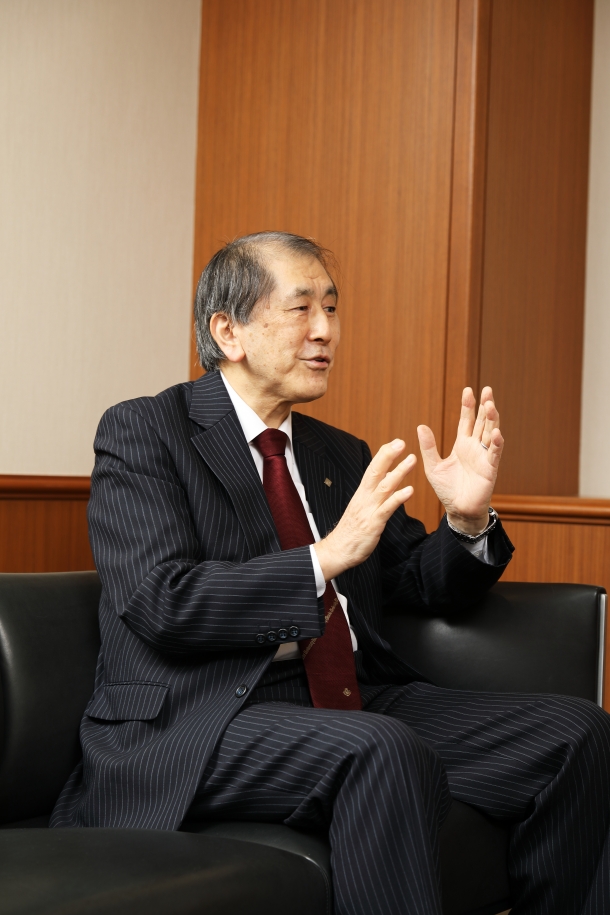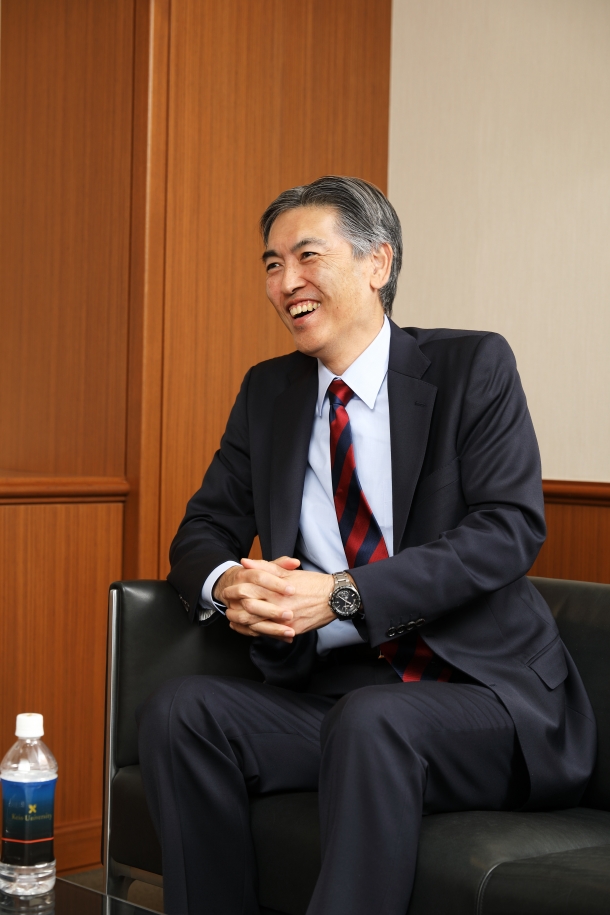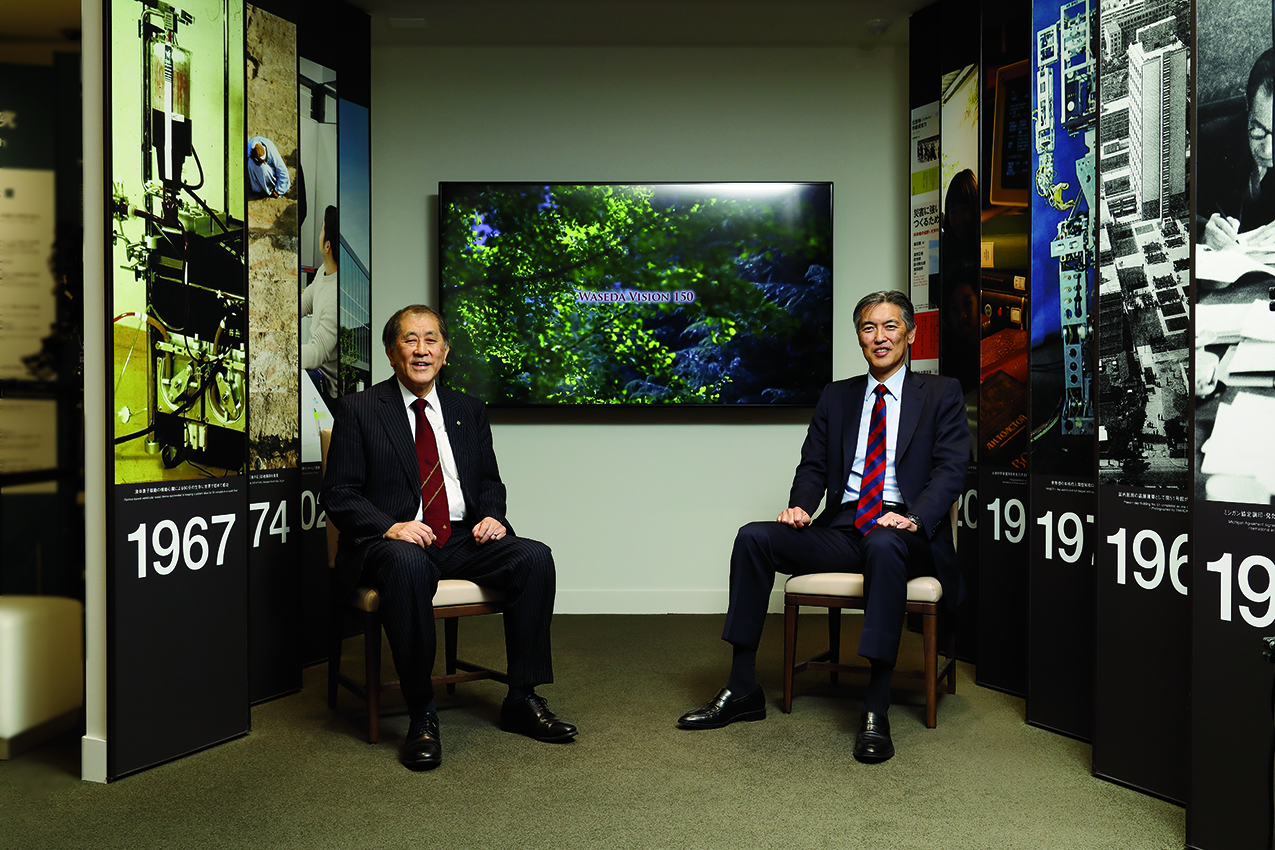Waseda and Keio: Entering a turning point in history
Mon, Feb 6, 2023-
Tags
Keio University President Kohei Itoh, who assumed office in May 2021, together with Waseda University President Aiji Tanaka, who entered his second term in September 2022, discuss the role of private universities in this era of drastic social change.

Waseda University President Aiji Tanaka
Two founding fathers who shared a vision of the future and went on to establish universities: Yukichi Fukuzawa and Shigenobu Okuma
Tanaka: Yukichi Fukuzawa and Shigenobu Okuma. The founders of the two universities are said to have been such close friends that they often visited each other’s houses. Despite being in different positions, as a scholar and a politician, they probably shared the vision of the future they were aiming for.
Itoh: The first volume of “An Encouragement of Learning,” which was a major work of Yukichi Fukuzawa, was published in 1872, so it reached its 150th anniversary last year, in 2022. The text includes the statement that, “The difference between being wise and foolish arises from whether a person chooses to learn or not to learn.” It was the era when the Meiji government started to take major steps toward a modern society, and probably taught the importance of the people learning.
After that, the history of Japan moved forward toward democracy, and I believe that Shigenobu Okuma was also aiming in the same direction in terms of “the construction of a bottomup type society” and “academic independence that is not controlled by authority.”
Tanaka: Shigenobu Okuma established the Constitutional Reform Party and worked for the establishment of parliamentary democracy from the position of the opposition party, so he was well aware that each independent person can go on to change society. It is thought that he was also highly influenced by Yukichi Fukuzawa. This is probably why he established a private university, so that the people could receive education equally.

Keio University President Kohei Itoh
It is in tumultuous times in particular that we should return to the spirit of the university’s foundation
Itoh: The achievements of Shigenobu Okuma as a politician included railway construction and the preparation of a postal system. Having a railway and being able to send mail meant that information could flow back and forth throughout Japan.
In a way, this innovation was like the Internet revolution of modern times. At the same time, there are many similarities between the Meiji period and the present, such as the questioning of what democracy should be, and geopolitical turmoil. As we are currently seeing drastic changes in the social situation, I think that this is a time when we should reexamine the spirit of the establishment of both universities.
Tanaka: At the ceremony to celebrate the 30th anniversary of the founding of Waseda University, Shigenobu Okuma said that, “It shall not be about one’s self, one’s family, or one’s nation. You must have the ambition to willingly contribute to the world.” From the start, Waseda University has been a university with strengths in diversity. It is a university that attracts students from all over Japan, and has a long history of accepting international students from many countries in Asia and beyond. Talented individuals who have been nurtured in an environment where there is a mix of diverse values should be able to demonstrate their abilities in the various fields in society and contribute to the world. I believe that if they wish to work actively for the sake of people, whether that is in a company, international organization, regional society, NPO or elsewhere, then we hope that Waseda University should be a university for which people will think, “learning at Waseda would be the most effective” in Japan by 2040 or in Asia by 2050.
Itoh: Regarding the purpose of Keio University, Yukichi Fukuzawa said, “Its mission is to be a constant source of honorable character and a paragon of intellect and morals for the entire nation and for each member to apply this spirit to elucidate the essence of family, society, and nation. They will not only articulate this essence in words, but also demonstrate it in their actions, and by so doing make Keio a leader of society.” We must be thorough about emphasizing individual dignity and independence and other aspects of “the essence of nation” as we go on to change Japan. I feel that this is precisely the time when this kind of attitude is required.
Tanaka: Japan would only be able to contribute to the world when it became a robust country. This was probably the vision held by Yukichi Fukuzawa as well.

Waseda University History Museum
The social responsibilities of private universities and the need for Waseda and Keio to work together
Tanaka: On the other hand, the Japan of today lags behind the rest of the world in areas such as digital transformation. The cause for that may also be education. We in Japan have highly competitive entrance examinations for high schools and universities that consequently led the Japanese educational system to separate learning humanities and social sciences from learning natural sciences. This was because Japanese educational system places so much emphasis on passing university entrance exams that our students need to focus on specific subjects from an early stage to pass entrance exams. The result of this educational system that separates learning humanities and social sciences from learning natural sciences has forced our students to have a poor ability to understand and imagine areas outside their specialties. I believe that another role of private universities is to work on the transformation of the current education system in Japan to eliminate these demerits.
Itoh: In order to approach complex issues such as low birth rates, human rights, and environmental issues, it is important to make pragmatic, data-based judgments. It is necessary to have Jitsugaku if each person is to make appropriate decisions and actions while looking ahead 100 or 200 years into the future. While Jitsugaku is not knowledge that will be immediately useful, it is also not empty theory. It is science that clarifies the truth empirically and solves the problems. Ever since the establishment of Waseda and Keio, they have both valued Jitsugaku throughout their long histories.
Tanaka: There is no doubt that many of the challenges facing Japanese society and humankind today are “questions without clear answers.” What is needed is global leaders who can carry the future 100 years from now on their shoulders. I believe that there are expectations that Keio and Waseda will take the lead in developing talented individuals as universities which emphasize Jitsugaku (applied science) and diversity. If we strengthen the cooperation between the two universities in the fields of education and research, and play a leading role in university reform, then this should become the first step toward changing future of Japanese society.














